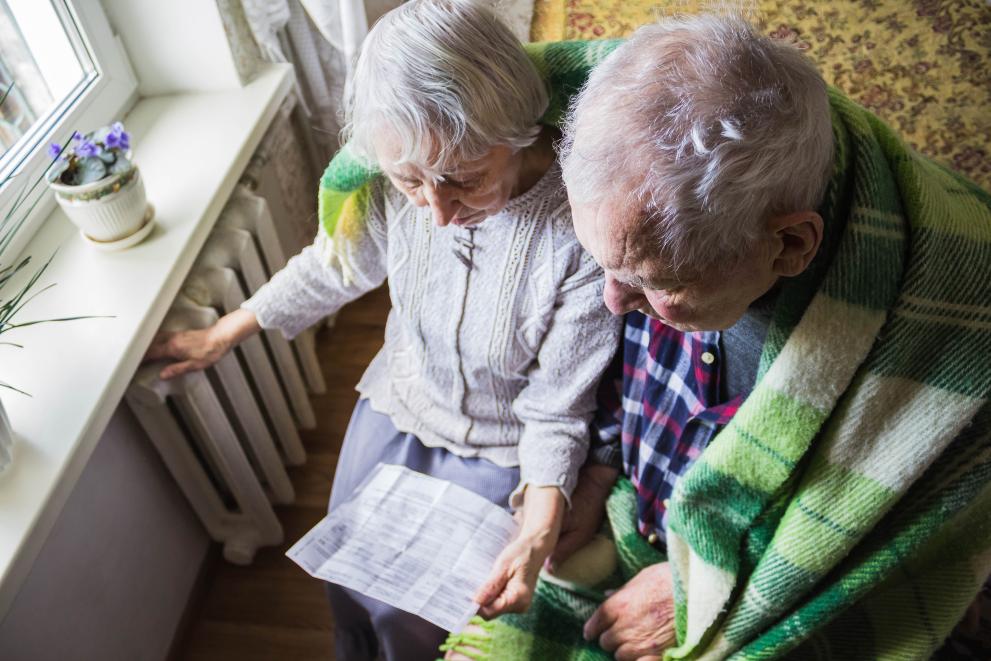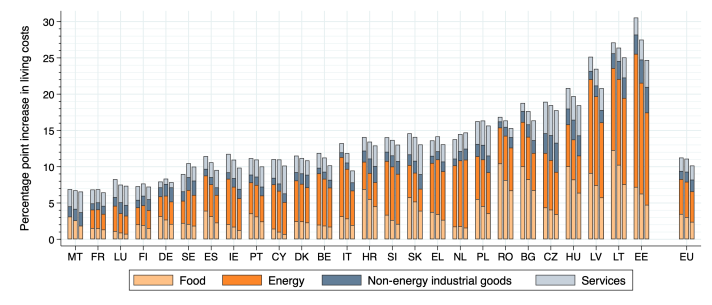
High inflation is eroding the purchasing power of individuals and families. As of August 2022, inflation has reached or approached double-digit levels in the European Union (10.1%) and the Euro area (9.1%), and surpassed 20% in several Baltic and Eastern European Member States. As current inflation is driven mainly by soaring food and energy prices, households in less wealthy EU countries or with low income are impacted more strongly, due to higher relative spending on such essential items.
A new Science-for-Policy report “The effect of rising energy and consumer prices on household finances, poverty and social exclusion in the EU” by the Joint Research Centre (JRC) of the European Commission takes a detailed view on the matter, analysing the expenditure structure of European households across main product categories, such as food, energy, industrial goods and services. Using innovative measurement strategies, this study is also the first to assess the uneven effects of inflation on various indicators of poverty and deprivation.
The study confirms that the adverse social effects of inflation are significantly larger in many Central and Eastern European Member States, especially among disadvantaged and vulnerable groups. Low-income households in these countries may devote twice as high a share of their total budget to food and energy than their high-income peers or wealthier households in other Member States. Consequently, the increase in European households’ living cost as a result of inflation between August 2021 and August 2022 was very uneven, and ranged between 7% and 30% across different countries and income segments. Poorer households are at a double disadvantage, which is deepening existing social gaps and inequalities across the EU.
Breakdown of the change in households’ living costs by country, income and product category
Notes: The left / middle / right bars represent the 1st / 3rd / 5th income quintiles, respectively. Data are based on the 2015 wave of the EU Household Budget Survey and recent inflation data from Eurostat (prc_hicp_manr).
Capturing the effects of inflation on poverty indicators from an innovative angle
While measuring the inflation effects on living costs and purchasing power is relatively straightforward, assessing the subsequent consequences on poverty and social exclusion is not so easy. Part of the reason lies with data lags and limitations surrounding European household surveys on income and consumption, but more important is the fact that many of the EU social policy indicators are only indirectly affected by changes in the cost of living. For example, of the three components of the AROPE indicator measuring the share of population at risk of poverty or social exclusion, only the component of severe material and social deprivation responds unequivocally to losses in households’ purchasing power.
The JRC study makes use of regression-based methods, historical data correlations and explorative research concepts to capture the preliminary effects of inflation on the social situation. Results indicate that rising living costs between August 2021 and August 2022 have increased material and social deprivation by around 2 percentage points at the EU level and up to 6 percentage points in selected Member States. The corresponding effects on absolute monetary poverty are considerably larger, and amount to 4.4 percentage points on average and up to 19 percentage points at the national level. The predicted effects on energy poverty – a situation in which households are unable to access essential energy services – are rather divergent and vary between 1 and 5 percentage points at the EU level, depending on the chosen metrics and expected energy saving on the part of households. In all of these dimensions, inflation appears to threaten the social fabric and widen existing inequalities across the EU.
The study finally calls for a strong and coordinated response from policymakers, which could benefit from improved data collection, better social monitoring, and more comprehensive data analysis. One potential area for intervention concerns short-term emergency measures aimed at mitigating some of the immediate consequences of price increases, such as reductions in VAT rates or excise duties on energy. However, support measures are more effective if they focus on low-income households and strengthen the redistributive capacity of fiscal policy and social protection systems. Targeted income support measures, in particular, can help channel public resources towards the most vulnerable and ensure that essential goods and services are readily available to all.
Background
The JRC has been collaborating with the other Commissions’ services to measure the social effects of inflation and propose adequate policy responses and protective measures.
The JRC Science-for-Policy Report “The effect of rising energy and consumer prices on household finances, poverty and social exclusion in the EU” contributed to various high-level policy documents of the European Semester Autumn Package, such as the 2023 Proposal for a Joint Employment Report 2023or the Autumn 2022 Economic forecast. This study also served as a valuable input for the recent ESDE Quarterly Review - October 2022 and the Commission Energy Poverty and Vulnerable Consumers Coordination Group.
Science-for-Policy reports convey the implications of scientific and technical evidence for a policymaking process. They are targeted at policymakers and others who are interested in formulating or influencing policy. These reports support any step of the policymaking process, i.e. policy initiation, implementation, assessment and revision. The aim of science-for-policy reports is to bridge the science-policy gap by bringing together evidence for policy from scientists across Europe, to policymakers across Europe.
Social policy and energy are shared competences, primarily the responsibility of EU countries.
Details
- Publication date
- 6 December 2022
- Author
- Joint Research Centre
- JRC portfolios





